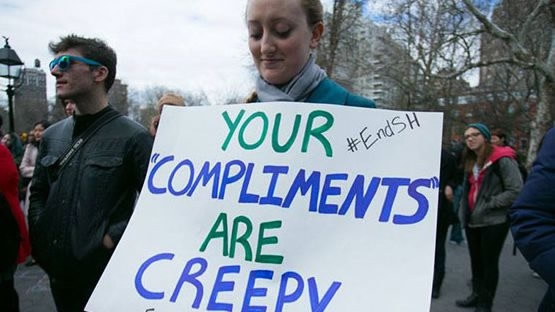
World
22:08, 23-Oct-2017
Catcalling could cost you in France - as govt plans to fine street harassers
By CGTN's Elena Casas-Montanez

The French Parliament is debating a law this week that would impose fines for street harassment, as well as increasing the age of consent law by giving women 30 years, rather than the current age limit of 20, to denounce sexual offenses to the police.
The law’s timing is coincidental, but the Harvey Weinstein scandal has sparked major public debate in France, with women of all ages and professions speaking out about their experience of sexual harassment on social media.
A lot of women’s experience would suggest that sexual harassment is a particular problem in France. In a recent survey covering 16 of the 19 major cities in the world, women were asked how safe they felt in the street. Men’s attitudes and ingrained machismo might have something to do with that. When asking people on the street about the idea of criminalizing catcalling, plenty of men answered that they didn’t see why they shouldn’t approach women, but the law would criminalize flirting.
Women took a very different approach. They mostly said they had enough of the comments and whistling from men in the street, and the new women’s minister Marlene Schiappa agrees. She says France is at a turning point in attitudes towards women, but the law needs to encourage change.

Women's minister Marlene Schiappa launching the draft bill on sexual harassment on Friday.
Women's minister Marlene Schiappa launching the draft bill on sexual harassment on Friday.
Carine Durrier-Diebolt, a defense lawyer for victims of sexual assault for 20 years says, the French attitude toward sexual harassment still has a long way to go. Women are still routinely asked in court what they were wearing or how much did they had to drink. She says the current justice system discourages women from reporting assaults, and training of magistrates and police officers on how to question victims in a more sensible way is as important as changing the law.
Women are coming forward in huge numbers on social media. Journalist Sandra Muller launched the hashtag #balancetonporc - translates to squeal on a pig, to encourage other women to report their experiences of harassment. It’s been a huge viral success.
Many high-profile men are already facing the consequences. For instance, a well know TV presenter was dismissed last week after allegations of assault were reported against him, and an MP in Emmanuel Macron’s La Republique en Marche party is facing a parliamentary inquiry into charges of assault and harassment by his former parliamentary assistant.

"@LettreAudio #squealonapig you too, tell your story of sexual harassment. I'm waiting for you." The tweet that launched France's online campaign. / Twitter Screenshot
"@LettreAudio #squealonapig you too, tell your story of sexual harassment. I'm waiting for you." The tweet that launched France's online campaign. / Twitter Screenshot

@angelinemontoya was 12 years old, eating an ice cream and an old man said to her, "I wish I was that ice cream." Angeline Montoya was one of the thousands of women to use the hashtag to talk about her experience.
@angelinemontoya was 12 years old, eating an ice cream and an old man said to her, "I wish I was that ice cream." Angeline Montoya was one of the thousands of women to use the hashtag to talk about her experience.
The fact that any action has been taken already feels like a noticeable change in France, where women are increasingly experiencing sleazy comments from senior men in the workplace and are often told they’re overreacting if they complain. Schiappa’s new harassment bill will face a parliamentary vote in the next few months, but campaigners are hoping the debate itself will be enough to make some French men realize the way they treat women needs to change.

SITEMAP
Copyright © 2018 CGTN. Beijing ICP prepared NO.16065310-3
Copyright © 2018 CGTN. Beijing ICP prepared NO.16065310-3